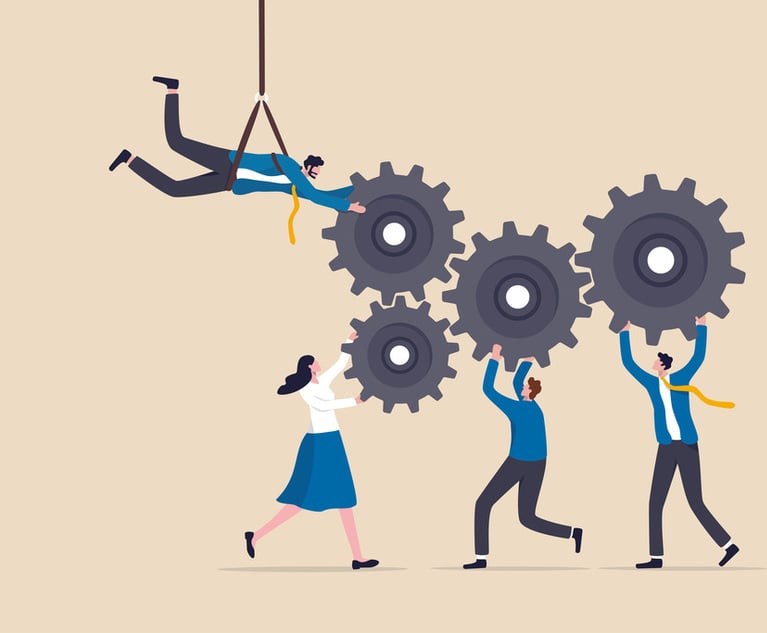Law Firm Personnel Don't Want to Work in the Office. They Want to Meet and Socialize
A new survey shows most people want to work remotely a majority of the time, and go to the office about once a week.
February 09, 2022 at 03:02 PM
6 minute read
 Credit: Gorodenkoff Productions OU/Adobe Stock
Credit: Gorodenkoff Productions OU/Adobe Stock
As the omicron variant begins its descent from public view, law firms are again readying themselves for a return to the office. But the past two years have changed how people in the legal community view the office: most of them don't want to be there for a majority of their work time.
Legal recruiting firm Major, Lindsey & Africa, in a follow-up flash survey to its "Lawyers' Perspectives on Returning to the Office" survey released last year, found that desire to be in the office has declined further in less than a year.
Just 27% of respondents want to be in the office three or four days a week, the survey found last month. That's down from 46% in March 2021, just 10 months before.
Still, 75% of respondents said they would like to be in the office at least one day per week.
But they don't see the office as a primary work destination.
This mindset presents a problem for law firms already in a compromised position due to ongoing talent wars. While most firms are using some sort of hybrid arrangement, many of those same firms also want their people in the office three or more days per week.
Stephanie Biderman, a partner in the associate practice at MLA and a co-author of the survey referenced above, said she wasn't surprised by the decline in desire to be in the office.
"The longer we are working remotely, the more people realize it works," she said. "Especially from a productivity and work-life balance standpoint."
She did say she thought another portion of the survey was of interest: There is not a massive push of people who want to work in a remote-only capacity.
"The percentage of people who wanted to work completely remote in March 2021 is the same (10%) that want to work remotely now," she said.
'A Slow Adjustment'
A C-level business professional at an Am Law 100 firm, who asked not to be named so they could speak freely, said they have been back in the office periodically. "The people I talk to most often are glad we are back in the office with any regularity," they said.
"As someone who changed jobs during the pandemic, I am getting more of that water cooler time and it is helpful for relationship building," the business pro added.
They said being in the office allows for creative and spontaneous interactions that add value. So does the ability to learn from others in person, they said. But, they also said, that time in the office will now need to be focused more deliberately on interactions and work that can't be done as well remotely.
"If you are not putting people in a position to have those types of engagements when they are in the office, it's pointless to drag them out of their homes," they said.
Biderman agreed. She said it will be a challenge for law firms to propose an umbrella mandate asking for three or more days in the office after people experienced the financial success and increased flexibility of the last two years.
"It is challenging to get people to come in three days a week if their work doesn't dictate it," she said. "Associates and partners are happy to come in if there is a reason, and firms are trying to be as creative as they can do figure out ways to entice people."
Julia Shapiro, CEO and founder of Hire an Esquire, said the very nature of law firm management structure compounds the difficulty of adjusting to "X" days of the week across the firm.
Separate fiefdoms, different needs for attorneys at various stages of their careers and practice areas that have unique needs all play a part in creating a situation where a one-size-fits-all approach is difficult to implement.
"For the majority of large law firms, it's going to be a slow adjustment rather than an organized, coordinated, well-executed effort in the next couple of years," she said in an email. "The organizational structure doesn't allow for coordinated, well-executed change."
What Is the Office Now?
It would be hard to argue that the office is canceled, especially for Big Law. In an apprenticeship-driven profession, face time with more senior personnel is key to the growth and development of younger lawyers.
Biderman, who specializes in associate recruiting, said there is a desire for many younger attorneys to be in the office.
"The juniors want to come in more than we give them credit for because they haven't had the training," she said.
But the varying needs of individual attorneys and their practice areas make an umbrella approach, such as three days a week in the office, hard to swallow for some.
"I predict from my decade-plus of watching the market that as the talent wars continue, firms will continue to make ad hoc, uncoordinated changes to accommodate remote work and much-needed associates that want to be fully remote," Shapiro said.
So what does the office become? When that coordinated response finally does manifest, what will it be?
Biderman believes a hybrid model is pretty much a given, but how that model looks could vary from firm to firm and even practice to practice.
She said partners don't want to do "bed checks" on whether people are in the office or not, so making that time worthy of a commute is paramount.
"You have to just give both associates and partners some level of independence on what is best for them and their team," she said. "Firms have to make time in the office more valuable. Training, mentorship, positive cultural events and team-building events. That is where the focus is going to have to be."
Shapiro noted that tech companies, particularly in Silicon Valley, have embraced an "in-service" model of office time.
"Someone will organize a happy hour or team collaboration because everyone wants to interact in real life," she wrote in an email. "Whether socially or to tackle a specific project where they think in-person interaction will be helpful, my guess is the future of work will be a lot of remote employees with retreats or 'in-services' in the office."
This, of course, could change if demand for legal services weakens and associates lose some of their power over firm management decisions.
Either way, Biderman contends the days of "coming into the office, shutting your door and doing work" might be over, permanently.
This content has been archived. It is available through our partners, LexisNexis® and Bloomberg Law.
To view this content, please continue to their sites.
Not a Lexis Subscriber?
Subscribe Now
Not a Bloomberg Law Subscriber?
Subscribe Now
NOT FOR REPRINT
© 2025 ALM Global, LLC, All Rights Reserved. Request academic re-use from www.copyright.com. All other uses, submit a request to [email protected]. For more information visit Asset & Logo Licensing.
You Might Like
View All

BCLP Enhances Financial Disputes and Investigations Practice With Baker McKenzie Partner
2 minute read
Quiet Retirement Meets Resounding Win: Quinn Emanuel Name Partner Kathleen Sullivan's Vimeo Victory

Trending Stories
- 1Trump Administration Faces Legal Challenge Over EO Impacting Federal Workers
- 2Supreme Court Considers Reviving Lawsuit Over Fatal Traffic Stop Shooting
- 3Long Hours and Lack Of Boundaries: Associates In India Are Leaving Their Firms
- 4Goodwin Procter Relocates to Renewable-Powered Office in San Francisco’s Financial District
- 5'Didn't Notice Patient Wasn't Breathing': $13.7M Verdict Against Anesthesiologists
Who Got The Work
J. Brugh Lower of Gibbons has entered an appearance for industrial equipment supplier Devco Corporation in a pending trademark infringement lawsuit. The suit, accusing the defendant of selling knock-off Graco products, was filed Dec. 18 in New Jersey District Court by Rivkin Radler on behalf of Graco Inc. and Graco Minnesota. The case, assigned to U.S. District Judge Zahid N. Quraishi, is 3:24-cv-11294, Graco Inc. et al v. Devco Corporation.
Who Got The Work
Rebecca Maller-Stein and Kent A. Yalowitz of Arnold & Porter Kaye Scholer have entered their appearances for Hanaco Venture Capital and its executives, Lior Prosor and David Frankel, in a pending securities lawsuit. The action, filed on Dec. 24 in New York Southern District Court by Zell, Aron & Co. on behalf of Goldeneye Advisors, accuses the defendants of negligently and fraudulently managing the plaintiff's $1 million investment. The case, assigned to U.S. District Judge Vernon S. Broderick, is 1:24-cv-09918, Goldeneye Advisors, LLC v. Hanaco Venture Capital, Ltd. et al.
Who Got The Work
Attorneys from A&O Shearman has stepped in as defense counsel for Toronto-Dominion Bank and other defendants in a pending securities class action. The suit, filed Dec. 11 in New York Southern District Court by Bleichmar Fonti & Auld, accuses the defendants of concealing the bank's 'pervasive' deficiencies in regards to its compliance with the Bank Secrecy Act and the quality of its anti-money laundering controls. The case, assigned to U.S. District Judge Arun Subramanian, is 1:24-cv-09445, Gonzalez v. The Toronto-Dominion Bank et al.
Who Got The Work
Crown Castle International, a Pennsylvania company providing shared communications infrastructure, has turned to Luke D. Wolf of Gordon Rees Scully Mansukhani to fend off a pending breach-of-contract lawsuit. The court action, filed Nov. 25 in Michigan Eastern District Court by Hooper Hathaway PC on behalf of The Town Residences LLC, accuses Crown Castle of failing to transfer approximately $30,000 in utility payments from T-Mobile in breach of a roof-top lease and assignment agreement. The case, assigned to U.S. District Judge Susan K. Declercq, is 2:24-cv-13131, The Town Residences LLC v. T-Mobile US, Inc. et al.
Who Got The Work
Wilfred P. Coronato and Daniel M. Schwartz of McCarter & English have stepped in as defense counsel to Electrolux Home Products Inc. in a pending product liability lawsuit. The court action, filed Nov. 26 in New York Eastern District Court by Poulos Lopiccolo PC and Nagel Rice LLP on behalf of David Stern, alleges that the defendant's refrigerators’ drawers and shelving repeatedly break and fall apart within months after purchase. The case, assigned to U.S. District Judge Joan M. Azrack, is 2:24-cv-08204, Stern v. Electrolux Home Products, Inc.
Featured Firms
Law Offices of Gary Martin Hays & Associates, P.C.
(470) 294-1674
Law Offices of Mark E. Salomone
(857) 444-6468
Smith & Hassler
(713) 739-1250









